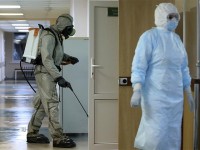He said Belarus would likely face economic tightening not only as a result of the coronavirus pandemic but also a Russian trade oil crisis that worsened this past winter.
Ulad Vialichka: Explosions in Brussels look like revenge for the arrests of terrorists

Unfortunately, the attacks in Madrid, London, Paris, and Brussels haven’t developed an antidote to terrorist threats in the European security system.
Explosions in Brussels that happened in the morning of March 22 agitated not only Belgium, but also the whole of Europe. It turned out that the capital of the European Union was too vulnerable when facing the threat of terrorist attacks, which will certainly cause a reaction. It’s hard to predict what the Belgium’s and the EU’s reaction to a new wave of terrorist attacks will be.
During the attack in Brussels a delegation of the Belarusan opposition happened to be there, who flew to the Euronest Parliamentary Session. No one from this delegation was injured — Maelbeek metro station is a stone's throw away from the European Parliament, where the Belarus Committee meeting started at 10 am on 22 March.
Ulad Vialichka, the co-chair of the Steering Committee of the Eastern Partnership Civil Society Forum, also happened to be at the scene. Ulad Vialichka shared his first emotions, reasons and possible consequences of the attacks with the EuroBelarus Information Service.
— What effect did explosions in Brussels — the actual capital of the European Union — produce?
— Brussels has experienced a real shock: the tragedy happened in the morning on a weekday. The city got immediately flooded with police and military men with machine guns; the attacks took place when the police was already on the alert. A series of attacks, of course, has instantly reflected on the life of the city: the number of people on the streets has significantly decreased, whereas Brussels is always full of people: citizens, tourists, and visitors, who come on business.
I haven’t noticed any panic; the city faced the tragedy quite courageously. I was amazed by the simultaneousness and solidarity, with which the whole Belgium revered the memory of the victims with the minute's silence the next day.
During the terrorist attacks in Brussels a lot of Belarusans happened to be there. One of the explosions occurred in the Maelbeek metro station, which is very close to the European Parliament, where the session of the Euronest Parliamentary Assembly started. At 10 am the Belarus Committee meeting was to start in the European Parliament, while explosions occurred an hour before the meeting. Judging by Uladzimir Niakliaeu’s posts on Facebook, hardly he went out from the Maelbeek station that the explosion in the subway occurred.
— Why it was Brussels that became the target of terrorists? They say that terrorists were preparing an attack on a nuclear power plant, but the arrest of an organizer of the Paris terrorist attacks forced the militants to hurry.
— Brussels is one of the major terrorist bases, one can say, their headquarters. We know that it was in Brussels where the Paris attacks were prepared.
Besides, Brussels is the capital of the European Union, and all the events taking place in the capital of Europe, are treated differently.
The attacks looked quite spontaneous; the explosions in Brussels look like revenge for the arrests of terrorists. We haven’t yet encountered situations where explosions happen in the city where the police are already on the alert. The situation is unusual, but, unfortunately, the terrorist attacks turned out to be possible. I was amazed because I was leaving Brussels on Thursday morning from the central station — there was no control at the entrance to the train station early in the morning, only after one and a half days after the bombings.
— How will the terrorist attacks affect the life of the European Union? Could a new round of terror lead to a revision of immigration policy?
— The terrorists were Belgium citizens, which indicates that it is not the migration flows that are the reasons for the attacks. The real reasons are still to be found. Of course, the terrorist attacks will affect the life of Belgium in the next few months: they will have to live with it, and look for an antidote to terrorism. It seems to me that the way of life of the Belgians is that they it’s hard for them to abandon the usual freedoms and the usual lifestyle. However, the usual freedom is now at odds with security issues. For now it is difficult to judge to what changes will Brussels attacks lead.
Such events pour oil on the flames of all right-wing groups, which will try to use the situation in their political rhetoric at the time of the election. We already see a wave of right-wing parties that are winning at the election, which is confirmed by the elections in Slovakia. Of course, terrorism will be one of the factors of European policy, which won’t play in migrants’ favor.
— What are the forces behind the terrorist attacks? For example, Vladimir Zhirinovsky is openly happy with the death of Europeans and claims that terrorist attacks in Brussels are useful for Russia.
— I don’t think that we should look for a Russian trace in the Brussels terrorist attacks. However, foolish TV statements of people, who have neither sympathy nor brains, are working against Russia itself. Events in Brussels are still mostly associated with Islamic radicalism; ISIS took responsibility for the attack. Taking into account the threats announced by ISIS, the issue of security is a long-term one and requires long-term solutions. It isn’t clear what the European Union will answer to these challenges. European security at the airports, at the stations, and in all public places is very vulnerable. We have survived Madrid, London, and Paris, and Brussels — but it’s not clear yet that the European security system generates an antidote to the terrorist threat.
Others
-
From farewell to a new Eastern policy and towards a new development
Poland and Germany were both initiators and drivers of a New Eastern policy linked to the Eastern neighborhood and Russia/Soviet Union.
-
Uladzimir Matskevich: The sooner the "Union State" is denounced, the better for Belarus
Not only does the “Union State” undermine the establishment of civilized relations with Europe, but it hinders the possibility of normal relations between Belarus and Russia.
-
Uladzimir Matskevich: The regime can no longer control the situation in the country
The authorities are unable to prolong the social contract with the people: there is no way out of the social crisis.
-
Press release of the BNP in connection with the next round of the dialogue in the format of the EU-Belarus Coordination Group
Belarusan National Platform of the Eastern Partnership Civil Society Forum welcomes the dialogue process in the format of the EU-Belarus Coordination Group, the third round of which was held in Minsk on 3-4 April 2017.








Comments
Andrei Yahorau — Al Jazeera: “Lukashenko is irresponsible”
He said Belarus would likely face economic tightening not only as a result of the coronavirus pandemic but also a Russian trade oil crisis that worsened this past winter.